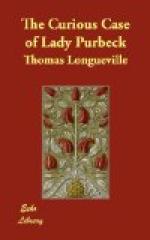There are ladies who call the story of Mary Magdalen “beautiful,” yet would on no consideration tolerate a repetition of even its most beautiful incidents, in real life. If she now existed, the greatest concession they would make would be to subscribe towards sending her to a Home for Fallen Women; or, which is more likely, they would ask for an order of admission for her from someone else who subscribed to such an institution. From such we cannot expect a charitable view of The Curious Case of Lady Purbeck.
It would be out of place to enter into petty theological questions in a comparatively trivial work such as this—to inquire, for instance, into the question whether it may not be as possible to be damned for detraction as to be damned for adultery; but we may at least believe that Lady Purbeck spent her later years in contrition for the past and virtue in the present.
We have now done with the curious case of Lady Purbeck, and it only remains to say something about the less curious cases of some of her descendants.
It might be supposed that “Robert Wright,” who was just of age at the time of his mother’s death, would be proud to bear the name of Villiers and to be acknowledged as the rightful heir to the estates and title of Viscount Purbeck. As time went on, however, he became ashamed of those privileges.[104] The son of a Cavalier, he became a Roundhead, and three years after the death of his mother he married one of the daughters and co-heiresses of his relative, Sir John Danvers, subsequently one of the judges who condemned King Charles I. to death.
He eventually obtained a patent from Oliver Cromwell to change his name for that of his wife, declaring that he hated the name of Villiers on account of the mischief which several of those who bore it had done to the Commonwealth; and as to the title of Viscount Purbeck, he disclaimed it with contempt.
But before the Commonwealth Robert Danvers, as he even then called himself, sat in the House of Commons as member for Westbury. When people want titles, they do not always find it easy to obtain them; but, when they do not want them, they cannot always get rid of them. Robert was summoned to the House of Lords, as a peer, to answer the very serious charge of having said that “he hated the Stuarts and that if no person could be found to cut off the King’s head, he would do it himself.” He refused to attend, on the ground that he was not a member of the House of Lords but of the House of Commons. This plea was not allowed, and he was actually compelled to kneel at the bar of the House of Lords and to beg pardon for his criminal words.
At the Restoration he remained an obstinate Roundhead, and, instead of showing any desire to claim the title of Viscount Purbeck, he obtained permission from Charles II. to levy a fine of his titles in possession and in remainder. Then he retired to an estate which he owned in the parish of Houghton in Radnorshire, bearing the curious name of Siluria. He died in the year 1676, at Calais, and in his will he is described as “Robert Danvers, alias Villiers, Esq.”




